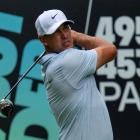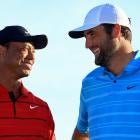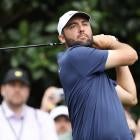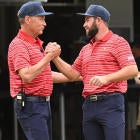
The first PGA Tour postseason event ostensibly starts on Thursday in Memphis, Tennessee, but the FedEx Cup Playoffs will actually begin on Tuesday in a California courtroom when a judge temporarily rules in the ongoing battle between the PGA Tour and LIV Golf.
Ahead of the proceedings, the PGA Tour filed the following motion in response to a recent lawsuit filed by LIV golfers looking to gain entry into the FedEx Cup Playoffs.
"Despite knowing full well that they would breach Tour regulations and be suspended for doing so, plaintiffs have joined competing golf league LIV Golf, which has paid them tens and hundreds of millions of dollars in guaranteed money supplied by Saudi Arabia's sovereign wealth fund to procure their breaches," the motion said. "[Temporary restraining order] plaintiffs now run into court seeking a mandatory injunction to force their way into the Tour's season-ending FedEx Cup Playoffs, an action that would harm all Tour members that follow the rules. The antitrust laws do not allow plaintiffs to have their cake and eat it too."
While the details of the 106-page lawsuit filed by 11 LIV golfers last week against the PGA Tour are extremely complicated, the premise of this week's tussle is simple: Three LIV golfers -- Matt Jones, Talor Gooch and Hudson Swafford -- qualified for and want to play in the FedEx Cup Playoffs over the next three weeks, and the PGA Tour is trying to keep them out because they breached their PGA Tour contracts.
The end result could be an event in Memphis that includes 128 golfers instead of the usual 125 depending on Tuesday's ruling. In the suit filed last week by the 11 LIV golfers, the FedEx Cup Playoffs were a primary concern.
Plaintiffs Gooch, Swafford and Jones (among other Plaintiffs) had earned the right to play in the FedEx Cup Playoffs (a series of lucrative and high-profile events scheduled at the end of the PGA Tour's 2022 season) through strong performance and dedication to the Tour, but the Tour has banned them from playing in those tournaments, diminishing the strength of its own fields and harming these Plaintiffs.
The injury to these players extends beyond mere foreclosure from these tournaments (itself a substantial and irreparable injury), but also cripples their chances of qualifying for both the Majors and the Tour's premier invitationals in future seasons. The punishment that would accrue to these players from not being able to play in the FedEx Cup Playoffs is substantial and irreparable, and a temporary restraining order is needed to prevent the irreparable harm that would ensue were they not to be able to participate.
Whether they are actually allowed to play this week at the FedEx St. Jude Championship at TPC Southwind -- where the total purse for the first playoff event is $15 million -- via temporary restraining order on the PGA Tour's ban of LIV golfers from its postseason events will be decided on Tuesday in the U.S. District Court for the Northern District of California.
The timing here is curious and important. The 11 players filed against the Tour last week knowing that a decision would be needed almost immediately for the FedEx Cup Playoffs and this would likely benefit them as a temporary restraining order could prove a more effective move in the short term. In fact, this is what allowed Ian Poulter, Adrian Otaegui and Justin Harding to play in the Scottish Open last month despite their original suspension from that tournament. PGA Tour commissioner Jay Monahan called out the timing in a letter to PGA Tour players just after the lawsuit dropped, and the notion was reiterated in the response on Monday.
TRO plaintiffs have waited nearly two months to seek relief from the Court, fabricating an "emergency" they now maintain requires immediate action. It doesn't. Their ineligibility for Tour events was foreseeable when they accepted millions from LIV to breach their agreements with the Tour, and they knew for a fact that they were suspended on June 9. The harm they now allege from their suspensions is 100% economic and capable of redress with money damages.
Indeed, several other LIV players, including four other plaintiffs in this case, recognize there is no emergency or irreparable harm; they too have qualified to play in the FedEx Cup but have not asked the court for the extraordinary relief sought through this motion. The court should use its equitable powers to redress real emergencies, not engineered ones by parties who knowingly accepted multi-million-dollar payouts to place themselves in the situation they are in.
It has become clear that while PGA Tour players are mostly ambivalent about their colleagues leaving to join the LIV Golf League, they are extremely displeased that these same players who took contracts from the Saudi Arabian's Public Investment Fund are now trying to double dip while most have remained steadfast on their commitment to the original tour.
While an immediate ruling will come this week regarding whether these golfers are allowed to play in the FedEx Cup Playoffs, this ruling is not necessarily a foreshadowing of how the entire case is going to go. Again, to put it in the simplest possible terms, LIV players are broadly suing the PGA Tour for the opportunity to play in both the LIV Golf League as well as the PGA Tour, akin to how golfers participate in both the DP World Tour and PGA Tour. The PGA Tour, however, is arguing and will continue to argue that LIV golfers have violated the PGA Tour regulations set in place for them.
"LIV is not a rational economic actor, competing fairly to start a golf tour. It is prepared to lose billions of dollars to leverage Plaintiffs and the sport of golf to 'sportswash' the Saudi government's deplorable reputation for human rights abuses. If Plaintiffs are allowed to breach their TOUR contracts without consequence, the entire mutually beneficial structure of the TOUR, an arrangement that has grown the sport and promoted the interests of golfers going back to Arnold Palmer and Jack Nicklaus, would collapse."
How all of this plays out will be interesting, but perhaps not ultimately consequential. Even if the court rules in favor of LIV golfers being able to play both tours in the long term, the LIV Golf League has yet to procure OWGR points, which allows its golfers to play in the biggest tournaments in the world, including the major championships.





















